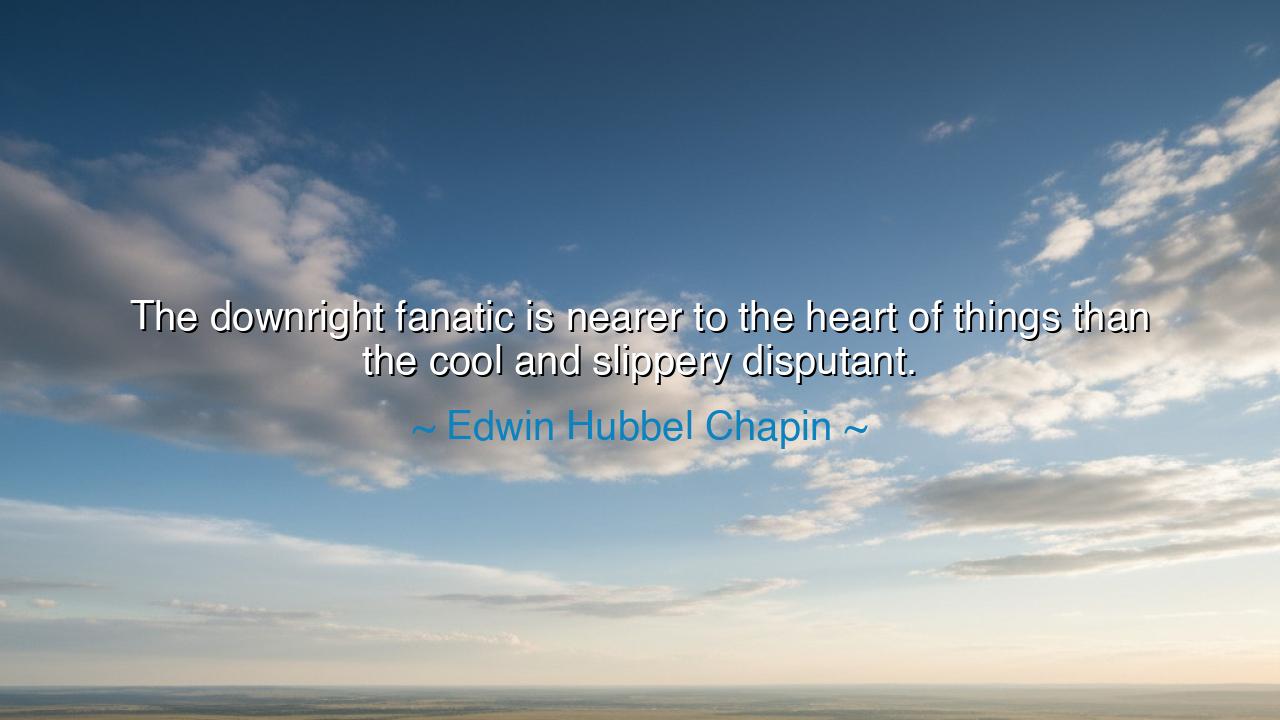
The downright fanatic is nearer to the heart of things than the
The downright fanatic is nearer to the heart of things than the cool and slippery disputant.






"The downright fanatic is nearer to the heart of things than the cool and slippery disputant." – Edwin Hubbel Chapin.
In these stirring words, Edwin Hubbel Chapin contrasts two types of people—the fanatic and the disputant. The fanatic, though often seen as overly intense or uncompromising, is depicted as someone who has a deep, unshakeable commitment to their beliefs or passions. In contrast, the cool and slippery disputant is someone who engages in debate with a certain detachment, always seeking to avoid commitment, to argue for the sake of argument, and to remain unmoved by their own arguments. Chapin suggests that the fanatic, for all their perceived flaws, is closer to the truth and passion of life than the detached, cerebral individual who may possess intellect but lacks the emotional depth to truly understand the heart of things.
The ancient philosophers, particularly the Stoics, often warned against the dangers of excess emotion. Seneca, for instance, advocated for reason as the guiding force of life, urging individuals to avoid being swayed by unchecked passion. However, while the Stoics prized reason, they also acknowledged that without passion, reason can become cold and detached, disconnected from the human experience. In this sense, Chapin’s words might be seen as a reminder that reason alone, without the grounding influence of emotional engagement, is often too abstract to grasp the full depth of human existence. The fanatic, in their unwavering commitment, lives with a depth of engagement that reason alone cannot match.
Consider the life of Socrates, whose philosophy was based not on cool detachment but on a fierce commitment to the truth. Socrates’ method, known as the Socratic method, involved passionate questioning and engagement, challenging his students to go beyond superficial understanding and confront the deepest truths of life. Though Socrates’ approach might be seen by some as fanatical, his unwavering commitment to uncovering truth—no matter the personal cost—shows the value of dedication. Socrates, in his relentless pursuit of wisdom, was not interested in the cool, slippery debates that only sought to win arguments, but in the deep and sometimes uncomfortable questions that led to real understanding.
The fanatic, while often seen with suspicion, carries within them a passion that is often the very thing that drives meaningful change in society. Look, for example, at the story of Martin Luther King Jr. and the Civil Rights Movement. King, though viewed by some as a fanatic in his unwavering commitment to justice, was ultimately closer to the heart of things than many of his critics. His uncompromising stance on nonviolent protest and equality, grounded in deep moral conviction, was a driving force in changing the course of history. In contrast, the disputant, who engages in debate without commitment, remains on the periphery of change, never truly engaging with the issues that shape the heart of society.
Chapin’s words also point to the importance of conviction in understanding the world. The cool and slippery disputant may possess intellectual prowess, but they are often more interested in demonstrating their ability to outwit others than in seeking truth. Such individuals may win arguments, but they risk missing the heart of things, the deeper truths that can only be felt and understood through commitment and action. Fanaticism, in this light, is not necessarily a flaw but a force of nature—a driving energy that propels individuals and movements forward, forcing us to confront the hard truths that the disputants are content to sidestep.
Thus, the lesson here is one of balance and engagement. While reason and intellect are invaluable tools for navigating the world, they must be tempered by a passionate commitment to the values we hold dear. The fanatic may be perceived as too intense or stubborn, but it is often their passion that makes them a force for change. In our own lives, we must strive to engage not just with our intellect but with our hearts. Let us not be afraid of dedication and commitment, for it is through such fierce devotion that we come closest to the truth of life and the human experience.
In conclusion, Chapin’s words remind us that in our pursuit of truth and understanding, we must feel deeply and engage fully. The fanatical dedication to a cause or belief can reveal the heart of what truly matters, while the disputant, without true commitment, remains on the surface, forever skirting the deeper truths of life. Let us be mindful of where our own passions lie, and let those passions guide us to the heart of things, where true wisdom and transformation reside.






AAdministratorAdministrator
Welcome, honored guests. Please leave a comment, we will respond soon